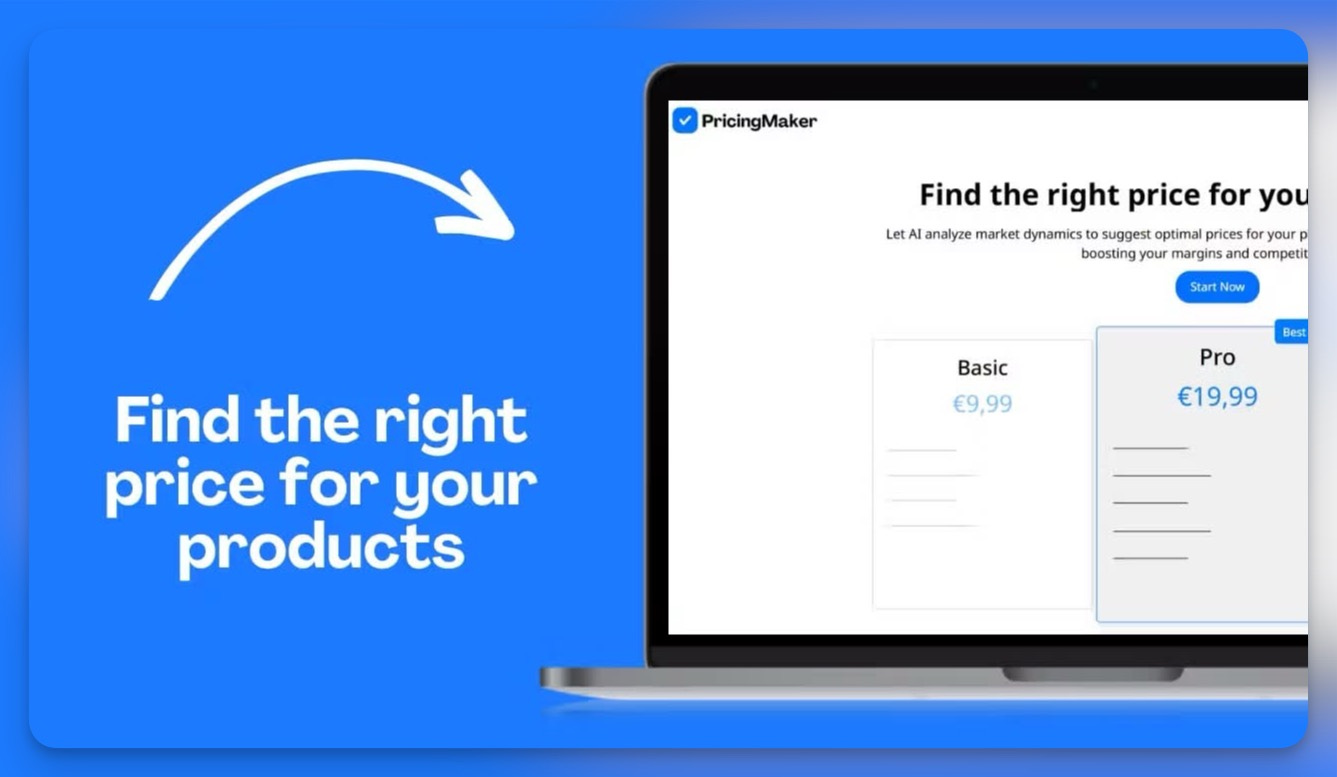🚀 How AI Helps in Pricing, Revenue Forecasting, and Why Reid Hoffman Is Concerned About Elon Musk's Conflict of Interest
s3e9. From Automating Business Processes to Political Challenges in AI: What Startups Need to Know Today
Greetings, tireless entrepreneurs and innovators! Today we will delve into the world of AI tools for business, learn how to accurately forecast a startup's revenue, and discuss the thoughts of leading industry players regarding the future of technology.
Development of Startups: PricingMaker—An AI Tool for Pricing Optimization
Startups often face the problem of setting the right prices for their products or services. Many do not have a systematic approach to pricing, make up prices off the top of their heads, or try to guess without conducting experiments. This is where PricingMaker comes to the rescue.
According to the developers: "PricingMaker provides free AI-driven pricing strategies for your business." This tool helps generate optimal product prices and pricing plans based on real market data, tailored to your business needs to maximize profitability.
Key features of PricingMaker:
Generation of optimal prices: Using AI and real market data, the tool offers the best pricing strategies.
Individual approach: Prices are adapted to the specific needs of your business.
Maximization of profitability: Helps increase revenue by setting competitive prices.
If you are looking for a way to systematize your approach to pricing and stop guessing, PricingMaker can be a useful tool.
https://www.producthunt.com/products/pricing-maker#pricing-maker
VC: How to Accurately Forecast Your Startup's Revenue
Brett J. Fox, in his article "How do you forecast your startup's revenue?", examines in detail the importance of accurate revenue forecasting and provides five steps to achieve it.
He emphasizes: "Getting your forecast right is critical to your startup's survival because getting your forecast wrong can have all sorts of damaging effects to your startup including the end of your startup."
Five steps for accurate forecasting:
Execute your plan: "The most impactful thing you can do to accurately forecast your business is execute your plan." Delays in product development can negatively affect your revenue.
Have a great team: "You need a great team if you expect to execute well." Without a strong team, even the best plan can fail.
Make a bottoms-up forecast: Forecast each customer individually to get the overall picture.
Use the "Graham Technique": "Take the average of the last three months of the company's revenue and compare that to the revenue 12–14 months earlier."
Compare your bottoms-up forecast with the forecast using the Graham Technique: This will help you be objective and honest in your assessments.
Fox also advises: "Underpromise and overdeliver." This will help you maintain the trust of investors and the team.
The full text of the article contains detailed examples and explanations that can be useful for any startup.
https://brett-j-fox.medium.com/how-do-you-forecast-your-startups-revenue-450567ed87da
Data: Hidden Productivity Drain Due to Cookie Banners
The company Legiscope, in its blog, examines the impact of cookie banners on productivity in Europe. According to their calculations, Europeans spend over 575 million hours annually interacting with cookie banners.
They note: "Collectively, Europeans spend over 575 million hours annually on consent prompts." This is equivalent to a company with 287,500 employees spending an 8-hour workday clicking on cookie banners.
Detailed calculations:
Number of internet users in the EU: 404.28 million.
Average number of websites visited per year: 1,200.
Number of cookie banners per user per year: 1,020 (85% of sites have banners).
Average time interacting with a banner: 5 seconds.
Total time per user per year: 1.42 hours.
Total time for all users: 404.28 million users × 1.42 hours ≈ 575 million hours per year.
Economic impact:
Average hourly wage in Europe: €25.
Total economic cost: 575 million hours × €25/hour = €14.375 billion.
This amounts to approximately 0.10% of the EU's total GDP.
The authors conclude: "These processes deliver minimal privacy benefits and little enhancement to business performance."
They call for a review of the ePrivacy Directive and exempting small and medium-sized businesses from the requirement to display cookie banners to reduce unnecessary economic and productivity losses.
https://legiscope.com/blog/hidden-productivity-drain-cookie-banners.html
Opinion: Reid Hoffman on Elon Musk's Potential Conflict of Interest in AI Policy
Reid Hoffman, co-founder of LinkedIn and Inflection AI, shared his expectations regarding Donald Trump's future administration in an article for the Financial Times. He expresses concern about a possible conflict of interest on the part of Elon Musk, who owns several technology companies, including xAI.
Hoffman notes: "Using his position to favor xAI in any way... will come at the expense of U.S. technological, economic and cultural security, and competitiveness."
Musk, who will also head the planned Department of Government Efficiency (DOGE) advisory commission, may influence regulations in industries where his companies operate, such as Tesla, SpaceX, and Neuralink.
Hoffman also highlights potential risks for the crypto industry, as Trump may favor certain cryptocurrencies, which could distort the market.
He concludes: "I very much hope that Trump succeeds wildly in enabling US entrepreneurship and innovation... That's why I will continue to do everything I can to build the next generation of companies that bring life-changing opportunities for individuals and society."
Video: Sam Altman, CEO of OpenAI, discusses the enormous impact of AI on the future in an interview with Garry Tan
With this, we conclude today's newsletter. Remember that using modern tools, accurate planning, and understanding global trends will help you stay one step ahead. Until next time!





